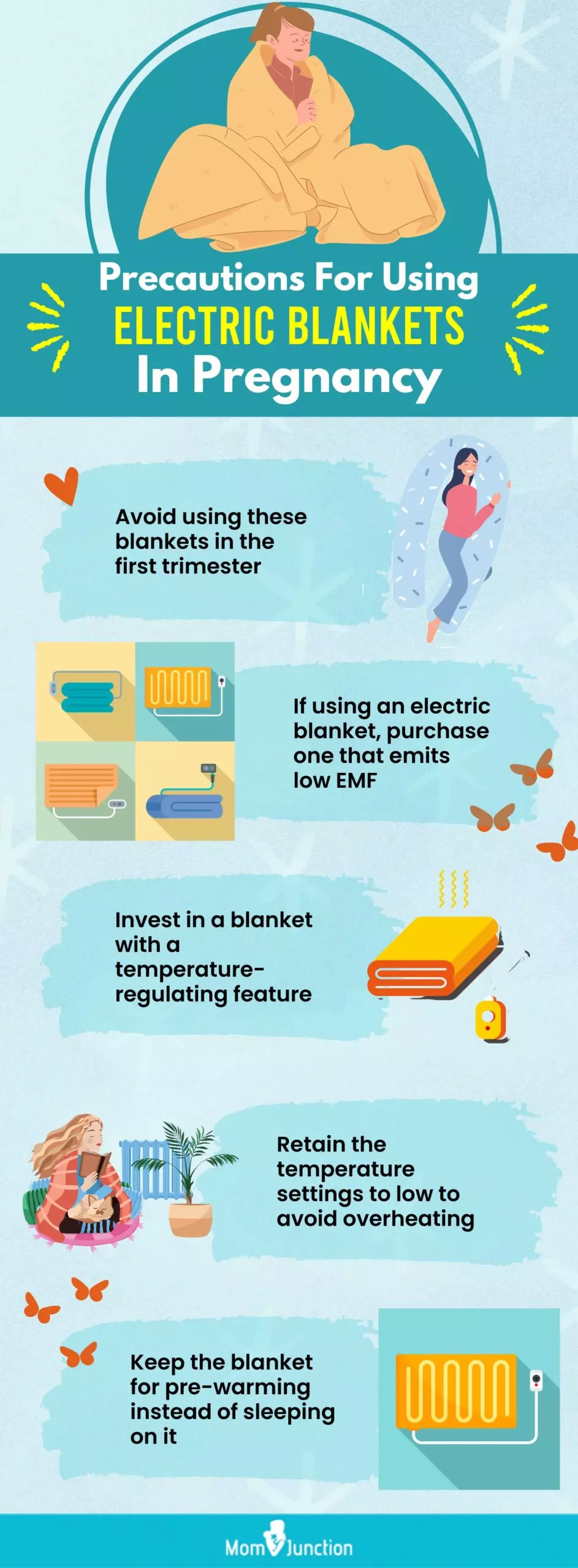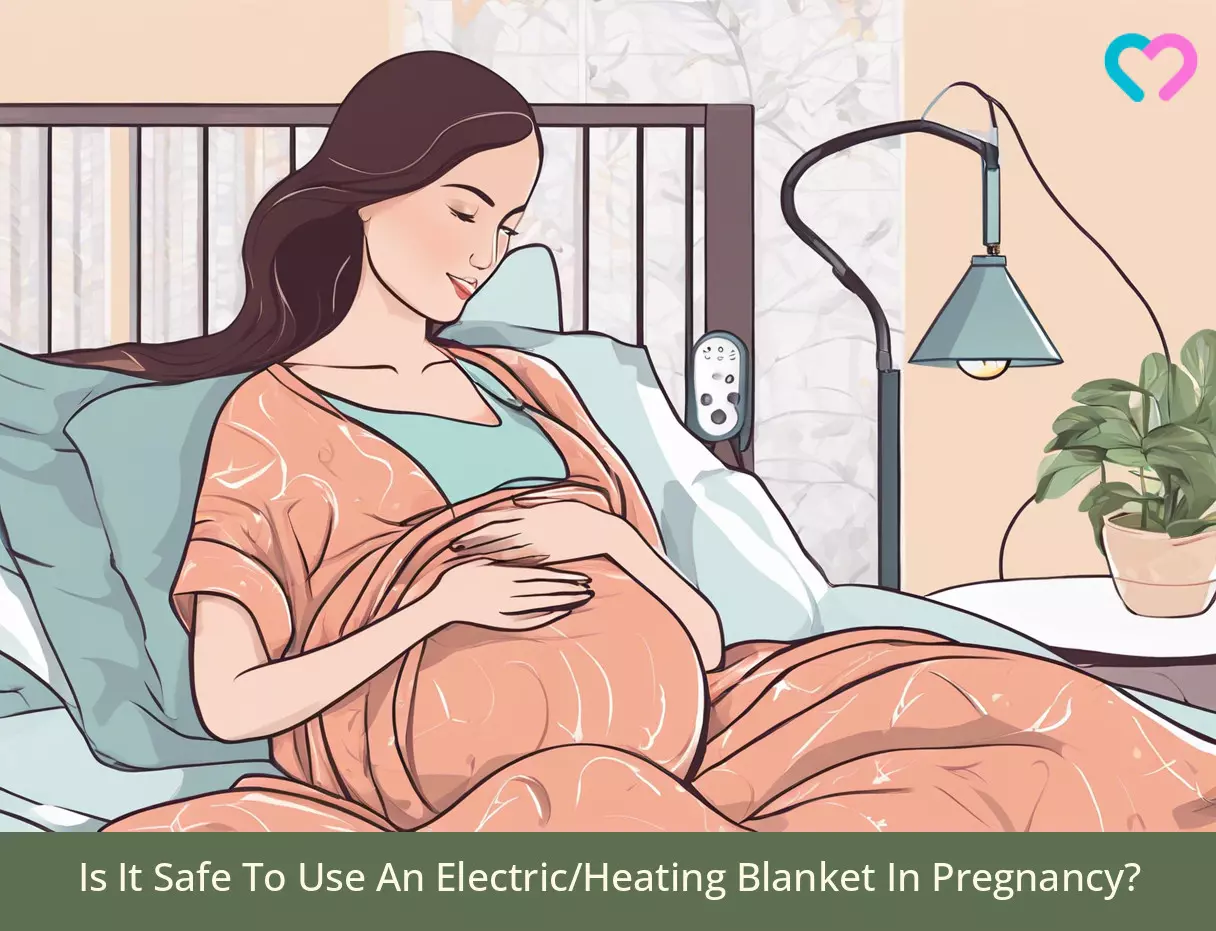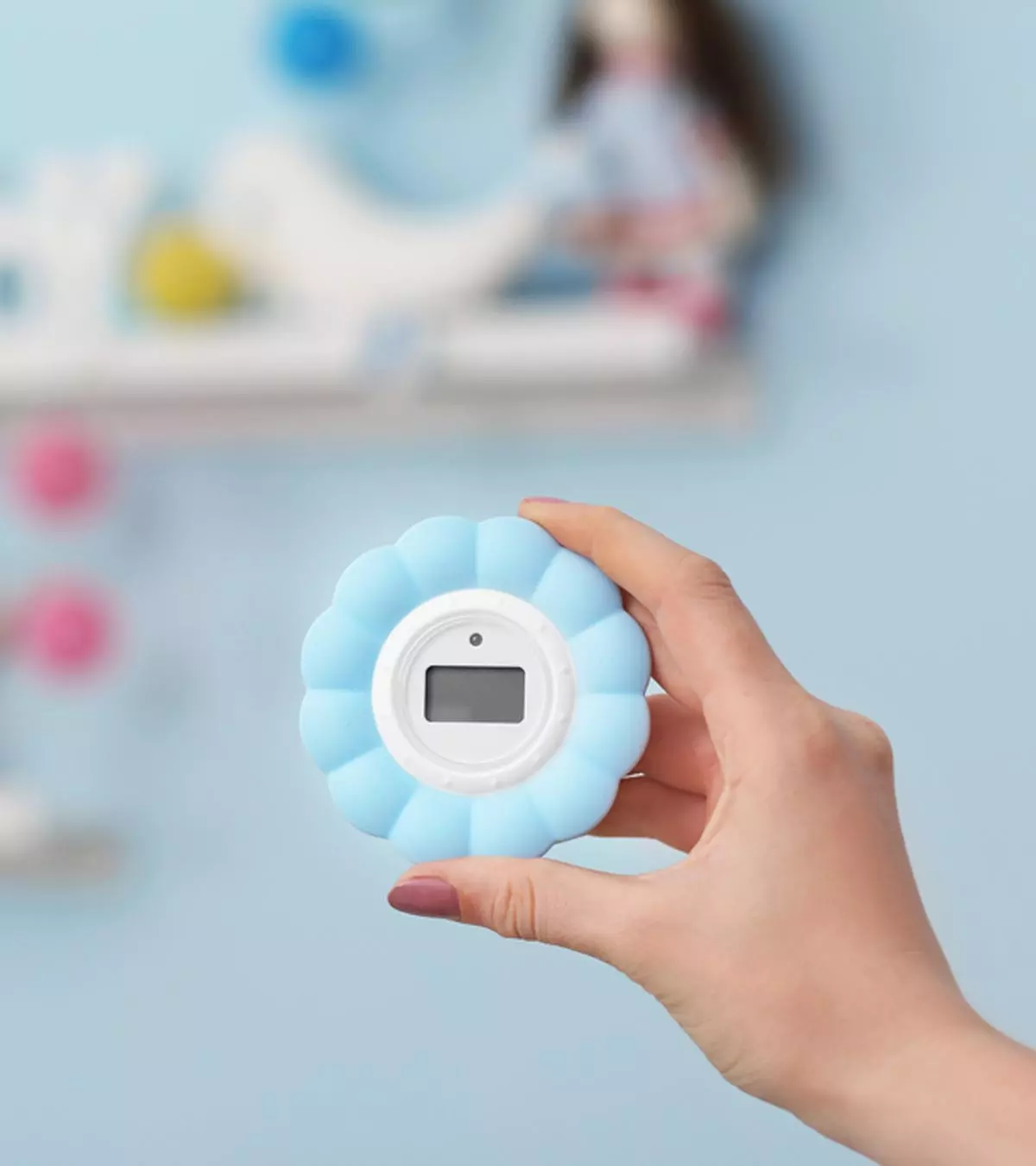
Image: MomJunction Design Team
Electric blankets often reduce or even eliminate the requirement of a heater in the bedroom. These blankets can be used to either warm up the bed or keep you warm while you’re in it. However, you should be careful while using electric blankets during pregnancy since they may raise the core body temperature. Other heating devices, such as heating pads and heated water beds, should also be used with precaution during this time.
Read on to learn if using an electric blanket is safe for pregnant women, how it may affect pregnancy, and what precautions you should take when using it.
Key Pointers
- Electric blankets are used to heat the bed or keep a person warm.
- However, using these blankets for a long time may increase the core body temperature beyond 102°F or 38.9°C.
- Some studies show that electric blankets may increase the risk of miscarriage or cause abnormalities in the fetus.
- Therefore, it is best to avoid using an electric blanket in early pregnancy and late pregnancy.
- Before choosing an electric blanket during pregnancy, it is suggested to take advice from a doctor or healthcare provider.
- Some alternatives to electric blankets are regular blankets, hot water bottles, and warm clothes.
Is It Safe To Use An Electric Blanket During Pregnancy?
You may use electric blankets as long as the temperature control setting is not high.
The core body temperature should not rise beyond 102°F (38.9°C). If the temperature crosses this level for more than ten minutes, then it could lead to overheating and an increased risk of dehydration and miscarriage (1). Therefore, before using these electric blankets, consider your pregnancy, any associated condition, stage of pregnancy, and overall health. You should also consult your doctor if you have any doubts regarding the use of an electric blanket for your pregnancy.
Potential Risks Of Using Electric Blanket During Pregnancy
Here are some of the probable negative effects of the use of electric or heated blankets on pregnant women and the developing fetus.
- A study conducted at Yale University found an increase in the risk of pregnancy loss (miscarriage) while using an electric blanket at the time of conception and pregnancy (2).
- Some studies note that prolonged use of an electric blanket can impact the fetal development by causing a slight increase in the risk of fetal neural tube defects (3). However, it needs further research.
- Electric blankets emit a low-frequency electromagnetic field (EMFs), and the fetus can get exposed to it. A study noted that these EMFs cause an increase in the risk of congenital urinary tract anomalies (CUTAs). This scenario was especially noted in women with a history of subfertility (delay in conception) (4).
- Another study reported an association between low-frequency EMFs and some brain tumors in children (5). However, it often happens due to occupational EMF exposure, and an electric blanket may not always cause such effects.
Precautions And Recommendations For Using Electric Blankets
If you have been using an electric blanket before pregnancy and want to continue it, talk to your doctor about it. Also, you may follow these prenatal care precautionary tips.
- Avoid using an electric blanket in early pregnancy when the risk of miscarriage is high.
- Do not use the electric blanket during the last weeks of pregnancy (or end of the third trimester) as the waters could break anytime. It may increase the risk of an electric shock.

Image: Shutterstock
- Buy an electric blanket that emits low EMF, and has a temperature-regulating feature.
- Keep low-temperature settings regardless of the pregnancy stage to lower the risk of overheating and EMFs.
- Use the blanket for pre-warming the bed instead of sleeping under it. If you wish to use it while sleeping, then turn it off after some time. Prolonged maternity use could increase the risk of overheating.
- Do not use any extra blanket or quilt on top of the electric blanket as it might overheat and cause other problems. Also, avoid sitting or lying on it. In case it is very cold, then you may use a thick duvet or comforter as the base bedding to sleep between the duvet/comforter and the electric blanket.
- Use it flat, and do not wrap it as it could damage the internal coils.
- Read the instruction manual and safety warnings before handling the blanket for safe sleeping.

- Image: Shutterstock
- Read the instruction manual and safety warnings before handling the blanket.
 Caution
CautionAlternatives To Electric Blankets
Here are some better and safer alternatives to avoid any adverse effects on the mother and the unborn baby.
- Blankets: Go for the old-fashioned, non-electric blankets made of materials such as cotton fleece, wool, and cashmere for a comforting and safe heat therapy experience. Also, using two or more blankets could help you stay away from the cold.

Image: Shutterstock
- Hot water bottles: Keep a hot water bottle close or use a warm compress to heat the bed. Although old-fashioned, it is likely to keep you warm. But avoid using hot water as it can cause burns.
- Warm clothes: Putting on a thick pair of pajamas, socks, a warming nightcap, or thermal comfort innerwear can keep you warm and cozy.
 Quick tip
Quick tipFrequently Asked Questions
1. How do I keep my room warm without an electric blanket?
To keep a room warm without an electric blanket, try adding insulation, sealing drafty windows and doors, using thick curtains, adding rugs, and using a space heater. Wear warm clothing and use a hot water bottle for extra warmth.
2. Do electric blankets use a lot of electricity?
Electric blankets work by dispersing heat through built-in wires and consume moderate electricity.
3. What is the difference between an electric blanket and an electric throw?
Heated throws usually cover a single average-size person and are frequently kept in the living room, home office, or vehicle. On the other hand, an electric blanket is used as bedding and is available in twin, full, queen, and king sizes.
4. Can I put a comforter on top of an electric blanket?
Heating blankets should usually be placed over a blanket and not under another blanket, as it can increase the risk of overheating during pregnancy. You should not place heating blankets under yourself as well.
5. What symptoms should I watch for if I use an electric blanket?
If you’re using an electric blanket for the first time during pregnancy, adhere to the safety instructions and be watchful of any adverse reactions. If you feel dehydrated, or experiencing a burning sensation, heat rashes, skin redness, or other unusual signs, stop using the blanket immediately.
The use of an electric blanket during pregnancy is safe as long as the temperature setting is not too high. High body temperature may increase the risk of miscarriage, dehydration, and fetal neural tube defects. In addition, the electromagnetic field emitted by electric blankets may also increase the risk of certain congenital anomalies. However, if you live in a cold region and feel cold at night, leading to a restless sleep, consider heating options such as using multiple blankets, hot water bags, or thicker sleepwear, considered safe for you and the baby.
Infographic: Measures To Take While Using Electric Blankets During Pregnancy
Experts recommend that you avoid using electric blankets, especially during the first trimester, to prevent the risk of complications. However, if you have been using these blankets for a while now and wish to continue using them when pregnant, note the precautions suggested in this infographic to ensure safe use. Illustration: Momjunction Design Team
Illustration: Is It Safe To Use An ElectricHeating Blanket In Pregnancy?

Image: Stable Diffusion/MomJunction Design Team
References
- Pregnancy Precautions: FAQs; Kids Health.
https://kidshealth.org/en/parents/pregnancy-precautions.html#:~:text=If%20your%20body%20temperature%20goes - Belanger K et al.; Spontaneous abortion and exposure to electric blankets and heated water beds; Epidemiology (1998)
https://pubmed.ncbi.nlm.nih.gov/9430266/ - Milunsky A et al.; Maternal heat exposure and neural tube defects; JAMA (1992)
https://pubmed.ncbi.nlm.nih.gov/1640616/ - Li DK et al.; Electric blanket use during pregnancy in relation to the risk of congenital urinary tract anomalies among women with a history of subfertility; Epidemiology (1995)
https://pubmed.ncbi.nlm.nih.gov/8562623/ - Li P et al.; Maternal occupational exposure to extremely low-frequency magnetic fields and the risk of brain cancer in the offspring; Cancer Causes Control (2009)
https://pubmed.ncbi.nlm.nih.gov/19224378/ - Electric blanket safety; Electrical Safety First
https://www.electricalsafetyfirst.org.uk/guidance/product-safety/electric-blankets/
Community Experiences
Join the conversation and become a part of our nurturing community! Share your stories, experiences, and insights to connect with fellow parents.
Read full bio of Dr. Mamta Sahu
Read full bio of Rebecca Malachi
Read full bio of Swati Patwal
Read full bio of Aneesha Amonz
















